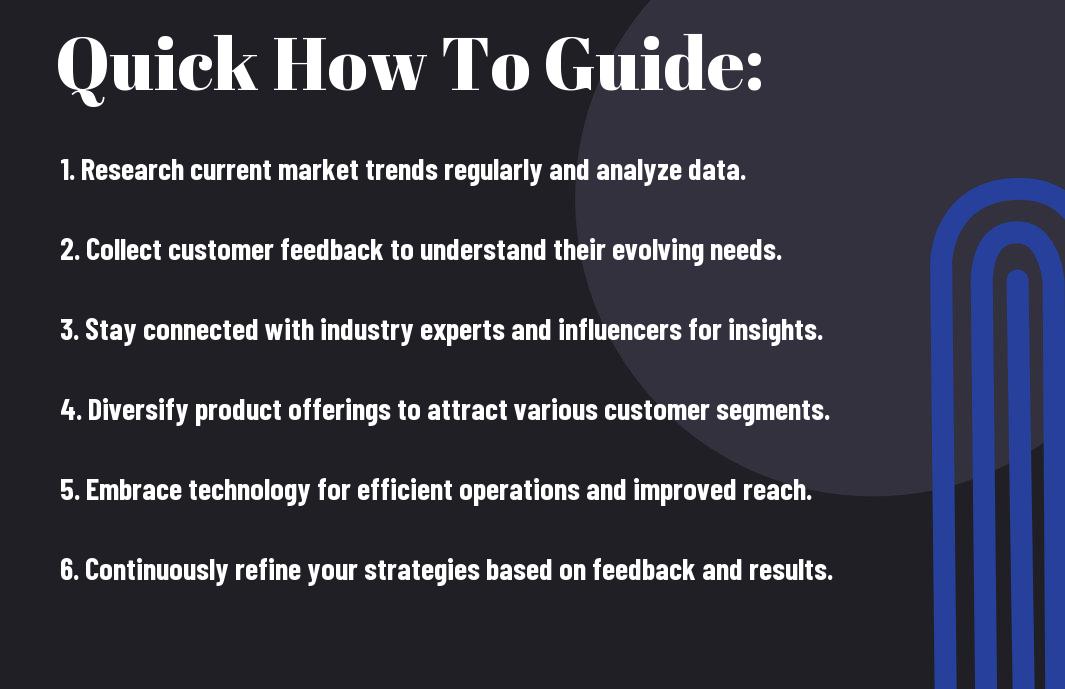
Adapt your strategies to the ever-evolving market landscape to remain competitive and relevant. In today’s fast-paced business environment, staying ahead requires you to be proactive rather than reactive. This guide will equip you with the vital steps to analyze, anticipate, and adjust to market trends effectively. By leveraging data, staying informed, and embracing innovation, you can ensure your business not only survives but thrives amidst change.

Understanding Market Trends
Adapting to changing market trends is imperative for your business to thrive. Understanding these trends involves recognizing shifts in consumer preferences, technology advancements, and economic factors that influence market dynamics. By staying informed and agile, you can position your business strategically to meet evolving demands.
Identifying Key Market Factors
To identify key market factors, you need to focus on elements that directly impact your industry. This includes:
- Economic indicators like growth rates
- Technological developments affecting production
- Regulatory changes shaping operations
- Social trends influencing consumer behavior
Assume that by monitoring these areas regularly, you will gain valuable insights to make informed decisions.
Analyzing Consumer Behavior
For effective adaptation, you must analyze consumer behavior to understand their preferences and purchasing habits. This involves tracking what drives their choices, and how external factors might influence these decisions. By relying on analytics and market research, you can make informed adjustments to your offerings.
For instance, if you observe a trend where consumers prefer sustainable products, you might consider shifting your product line to include greener options. Understanding this behavior allows you to tailor your marketing strategies and product development to meet their needs effectively. By staying attuned to your customers, you can create offerings that resonate with them and drive loyalty.
Adapting Business Strategies
There’s no doubt that staying relevant in the marketplace requires continual adaptation of your business strategies. As market trends evolve, you must be prepared to pivot and refine your approach to maintain a competitive edge. This includes reassessing your product offerings, fine-tuning your marketing tactics, and ensuring that your team is aligned with your overall vision. By actively engaging in this ongoing process, you are more likely to anticipate changes and seize new opportunities that can drive growth.
Flexibility in Product Development
On the journey of product development, it’s important to remain flexible. Adapt your designs and features based on customer feedback and emerging trends. This responsiveness not only enhances your product’s appeal but also demonstrates to your customers that you value their input. By being open to adjustments and iterations, you can create stronger products that resonate well in a dynamic market.
Modifying Marketing Approaches
Any successful marketing strategy must evolve with changing consumer preferences and technological advancements. Utilizing analytics and customer data enables you to identify shifts in behavior, allowing you to recalibrate your messaging and channels effectively.
Development of new marketing strategies can involve experimenting with different platforms, exploring influencers, or diversifying content formats. Stay attuned to emerging social media trends and adjust your campaigns to better connect with your target audience. By regularly evaluating the performance of your marketing initiatives and being willing to make necessary changes, you can ensure your messages are impactful and aligned with what your customers are looking for.
Leveraging Technology
After recognizing the importance of adapting to market trends, you can significantly enhance your strategies by leveraging technology. By embracing innovative tools and platforms, you can streamline operations, improve customer engagement, and ultimately stay ahead of competitors. Investing in technology equips you with the necessary resources to respond efficiently to market changes and capitalize on emerging opportunities.
Utilizing Data Analytics
The ability to analyze consumer behavior and market trends through data analytics enables you to make informed decisions. By collecting and interpreting data, you can identify patterns, tailor your offerings, and optimize your marketing strategies to align with your target audience’s preferences.
Embracing Digital Tools
Even as the market evolves, the integration of digital tools into your business processes can enhance efficiency and innovation. From project management software to customer relationship management (CRM) systems, utilizing these technologies allows you to collaborate effectively, track performance, and improve overall customer experiences.
To fully embrace digital tools, consider investing in platforms that align with your business goals. Automation tools can free up your time, allowing you to focus on strategic planning and relationship building. Additionally, leveraging social media and online marketing tools can expand your reach and engage your audience more effectively. By continually exploring and adopting new technologies, you can better position yourself to navigate a changing market landscape successfully.
Networking and Collaboration
Now is the time to prioritize networking and collaboration in your industry. By building relationships with like-minded professionals and organizations, you can leverage these connections to stay informed about market trends and gain valuable insights. Networking not only opens doors to new opportunities but also allows you to share knowledge and resources, ultimately enhancing your adaptability in a constantly changing environment.
Building Strategic Partnerships
If you want to strengthen your position in the market, focus on building strategic partnerships. Collaborating with other businesses can provide access to new customer bases and innovative solutions, enhancing your ability to respond to evolving market demands. Seek out organizations that complement your offerings and share similar goals for mutual benefit.
Engaging with Industry Experts
Any time you engage with industry experts, you’re positioning yourself to absorb valuable insights and trends that can shape your strategy. These experts have their fingers on the pulse of the market and can provide you with guidance on best practices and emerging opportunities.
Collaboration with industry experts can lead to significant advantages for your business. By tapping into their experiences and knowledge, you can gain a fresh perspective on challenges and potential solutions. Consider attending conferences, participating in workshops, or joining online forums where these experts share their insights. Establishing a rapport with them can open doors to mentorship opportunities, further equipping you with the tools and strategies to remain agile in a fluctuating market.
Continuous Learning and Training
Unlike many businesses that falter under pressure, you can thrive by prioritizing continuous learning and training. This dynamic approach enables you to adapt your skills and knowledge consistently, ensuring your expertise remains relevant in a rapidly changing market. By fostering a culture of growth, you empower yourself and your team to innovate and tackle emerging challenges effectively.
Staying Informed on Trends
While staying informed on industry trends is vital, you must actively seek out news, insights, and thought leadership in your field. Engaging with professional networks, following key influencers, and participating in relevant forums will help you stay ahead. Make it a habit to dedicate time each week to exploring these resources to sharpen your competitive edge.
Investment in Employee Development
Clearly, investing in employee development not only enhances your team’s skill set but also drives overall business success. By providing training programs, workshops, and access to online courses, you cultivate a knowledgeable workforce that can rapidly adapt to market changes. This commitment demonstrates your value for their growth, increasing morale and retention while directly benefiting your organization’s performance.
Informed employees contribute their enhanced skills back to your company, leading to innovative solutions and increased efficiency. By supporting their professional journeys, you’re not just enhancing individual capabilities but also building a more resilient organization. Additionally, this focus on growth can foster collaboration and creativity, as your team feels empowered to share insights and propose improvements based on their learning experiences. Ultimately, nurturing your employees’ development results in a competitive advantage, positioning your business to respond swiftly to changing market demands.
Implementing Feedback Loops
Once again, establishing effective feedback loops is crucial for agile adaptation in today’s dynamic market landscape. These loops empower you to collect valuable information from your customers and stakeholders, allowing you to refine your offerings and stay ahead of the curve. By fostering a culture of continuous feedback, you can make informed decisions that directly reflect the evolving needs and preferences of your audience.
Gathering Customer Insights
Insights into your customers’ experiences and opinions provide a foundation for improvement. Utilize surveys, interviews, and social media interactions to gather meaningful feedback. By actively seeking their perspectives, you can identify trends, pain points, and opportunities that will enhance your product or service offerings, ensuring they resonate with your target market.
Iterative Improvements
On the path to refinement, iterative improvements allow you to make incremental changes based on the feedback you gather. This approach encourages you to test, assess, and adjust your offerings continuously, rather than implementing sweeping changes all at once.
Understanding the importance of iterative improvements can transform your business. By viewing each change as an experiment, you create an environment that fosters innovation and responsiveness. This allows you to evaluate the impact of adjustments in real-time, ensuring that you remain aligned with customer expectations and market demands. As you adopt this mindset, you pave the way for sustainable growth and enhanced customer satisfaction.
Final Words
Following this guidance will empower you to effectively adapt to changing market trends and maintain a competitive edge. By continuously analyzing market data, embracing innovation, and staying connected with your customer base, you can make informed decisions that drive your success. Regularly revisiting your strategies allows you to pivot when necessary, ensuring your business remains relevant and responsive. Equip yourself with the right tools and mindset, and you’ll navigate the complexities of the market with confidence and purpose.
Leave a Reply